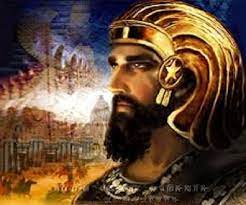The Deliverance by Cyrus the Great
44:24 to 45:25

ADONAI, the Redeemer of Isra’el and the Creator of the universe, has appointed Cyrus to accomplish His plans for His people. In this near historical prophecy, God names the man that He is going to use to deliver the Jews from Babylon (see the commentary on Jeremiah, to see link click Gu – Seventy Years of Imperial Babylonian Rule). Isaiah is living 150 years before Cyrus comes on the scene. Throughout Chapters 40 through 44, the LORD has been hinting of a man coming from the east and from the north, because one of Cyrus’ parents was Persian from the east and the other one was Median from the north. But God’s prophecies in those five chapters were becoming more and more specific. Throughout His hinting of the coming of Cyrus, without actually naming him so far, ADONAI has been comparing Himself with false idols and false prophets. This was to show that idolatry, especially Babylonian idolatry, is incapable of prophesying and predicting anything. But the LORD will predict everything in detail and everything He predicts will come true. Now in 44:28, God will specifically name the deliverer Cyrus.
The rise of Cyrus, king of Anshan (a city in Persia), was swift and impressive. When he came to the throne in 559 BC, Persia was subject to Media. By 549 BC, he was strong enough to rebel, kill the Median king Astyages, and found the Medo-Persian Empire. In the next few years he pushed out its boundaries dramatically. He first moved west, conquering King Croesus of Lydia in 547 BC and subduing Asia Minor (now Turkey). Then he turned east to extend his rule into northwest India. By 540 BC he had brought much of the former Babylonian Empire under his rule and was threatening Babylon itself. It fell to his general Gubaru without a fight in 539 BC, and seventeen years later Cyrus himself entered the city. There was no bloodshed; the previous king, Nabonidus, and his son Balshazzar, were deeply unpopular with the people of Babylon, many of whom regarded Cyrus as a liberator. For those who had been brought to Babylon against their will, the advent of Cyrus proved to be a blessing. He reversed the Babylonian policy of deportation and quickly embarked on a policy of repatriating displaced people and restoring their places of worship, the captives from Jerusalem being one of the first groups to benefit. The substance of his decree permitting their return is recorded in Ezra (see the commentary on Ezra-Nehemiah Ai – The Decree of Cyrus).168
This important passage bursts upon us rather surprisingly at this point. The surprise is that Cyrus should be spoken of as the LORD’s shepherd (44:28) and His anointed (45:1), immediately after a passage in which idolatry had been so strongly condemned. For Cyrus himself was an idolater! But there is an important lesson here. ADONAI may disapprove of idolatry but use an idolater for some good purpose. The fact that He uses someone in a specific way does not mean that He approves of that person’s lifestyle. Because the LORD uses the Adversary’s evil schemes to achieve His own godly purposes, it should not surprise us that He could use a pagan king. As a result, we should not stand in judgment of God’s actions nor draw wrong conclusions from them. His use of Cyrus to shepherd His people home was a stunning demonstration of that sovereignty.169



Leave A Comment